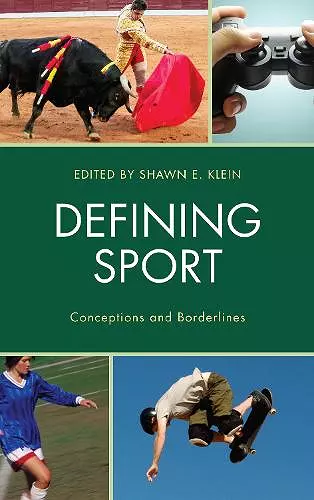Defining Sport
Conceptions and Borderlines
Format:Hardback
Publisher:Lexington Books
Published:14th Dec '16
Currently unavailable, and unfortunately no date known when it will be back
This hardback is available in another edition too:
- Paperback£45.00(9781498511599)

Defining Sport: Conceptions and Borderlines is not about the variations of usage of the term “sport.” It is about the concept, the range of activities in the world that we unite into one idea—sport. It is through the project of defining sport that we can come to understand these activities better, how they are similar or different, and how they relate to other human endeavors. This definitional inquiry, and the deeper appreciation and apprehension of sport that follows, is the core of this volume. Part I examines several of the standard and influential approaches to defining sport. Part II uses these approaches to examine various challenging borderline cases. These chapters examine the interplay of the borderline cases with the definition and provide a more thorough and clearer understanding of both the definition and the given cases. This work is not meant to be the definitive or exhaustive account of sport. It is meant to inspire further thought and debate on just what sport is; how it relates to other activities and human endeavors; and what we can learn about ourselves through the study of sport. This book will be of interest to scholars in philosophy of sport, history, communications, sociology, psychology, sports management, cultural studies, and physical education.
Shawn Klein’s edited volume, Defining Sport: Conceptions and Borderlines, is both the fruit of and a valuable contribution to such an emerging field. . . On the whole, I think this volume will be useful especially to faculty teaching philosophy of sport to undergraduates. * Reason Papers *
Defining Sport offers a collection of 13 essays dealing with philosophical conceptions of sport through a non-traditional lens that Klein (philosophy, Arizona State Univ.) refers to as “borderline cases.” For this reviewer, the book was a refreshing alternative to the continual writings on what can be termed "mainstream” or “commercial” sport. The book is divided into two distinct parts. The first part deals with the concept of sport—examining the array of activities that are collected under this term. It is imperative to indicate that this collection is not about defining or debating the use of the term “sport.” Rather, it is a philosophical examination of the meaning of sport that provides a rich historical and, at times, sociological context. Part 2 provides an exploration of “borderline cases”—i.e., physical activities that have challenged the traditional concept of sport. For example, some essays explore CrossFit, skateboarding, animal sport, e-sport, and fantasy sport. In this section, each of the essays provides thorough information about the sport, an alternative view of sport, and the space sport occupies in both scholarly work and society as a whole. Summing Up: Recommended. Upper-division undergraduates and above; researchers and faculty. * CHOICE *
The book is meant to reach a wide range of readers, including scholars in philosophy of sport, history, communication, sociology, psychology, sport management, cultural studies and physical education. In my opinion, it has great potential to be a standard tome for many of these groups of readers. If you are looking for a book to give you a short but full introduction to theories of what sport as a concept is, and empirical contributions based on these theoretic approaches, this is the book for you. * Idrottsforum.org *
Defining Sport is not about the many ways the term ‘sport’ is used. Rather it is about sport as a concept, about the range of activities in the world that we unite under the idea of ‘sport’. The editor argues that it is through trying to define sport that we can come to understand these activities better and how they relate to other social spheres and human endeavors. The anthology is meant to inspire further thought and debate on just what sport is and what we can learn about ourselves through the study of sport. * Trek and Ice *
This collection brings new vistas to the established project of conceptualizing sport. It explores paradigmatic cases but also ventures boldly into cases that test the contours of conceptual boundaries. By inviting us to keep furthering our thoughts and discussions of what sport is and how it functions, this collection helps us understand and appreciate more deeply a practice that has fascinated humans for centuries. -- Cesar R. Torres, State University of New York
Defining Sport contributes greatly to the current Philosophy of Sport dialogue and, at the same time, explores well beyond it. It provides a strong approach to establishing a framework for discussing sport as well as an opportunity to explore much of the recent phenomena and changes in sport—the “borderline cases”—which have yet to be addressed. In short, it invites readers to view sport in a fresh, new light. This is an ideal text which will surely serve as a catalyst for deep reflection and thoughtful discourse. -- Jack Bowen, Menlo School
Understanding sport requires understanding the concept of sport, what it means and what sorts of activities it refers to that distinguish it from other human endeavors. But getting a handle on the concept of sport, defining it, has proved to be a notoriously difficult enterprise. Klein’s finely edited volume, the first dedicated exclusively to this topic, is thus a welcome addition to the literature that spreads much needed light on this vexing subject while sparing us none of the complexity that bedevils it. -- William J. Morgan, University of Southern California
ISBN: 9781498511575
Dimensions: 238mm x 158mm x 21mm
Weight: 503g
278 pages